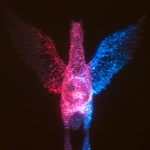natural selection
"Death is the only wise adviser that we have. Whenever you feel, as you always do, that everything is going wrong and you're about to be annihilated, turn to your death and ask if that is so. Your death will tell you that you're wrong; that nothing really matters outside its touch. Your death will tell you, 'I haven't touched you yet'." -Carlos Castaneda
"When a man starts to learn, he is never clear about his objectives. His purpose is faulty; his intent is vague. He hopes for rewards that will never materialize for he knows nothing of the hardships of learning. And his thoughts soon…
As an alternative to biblical creationism, Intelligent Design infers a less obtrusive God to explain life on Earth. This deity doesn't hurl bolts of lightning, unless it's with the express purpose of sparking abiogenesis in the primordial soup. On EvolutionBlog, Jason Rosenhouse dismisses probabilistic arguments against the likelihood of complex organisms, explaining that even the most improbable-seeming outcome of natural selection is more or less inevitable. As a flawed analogy, he imagines flipping a coin 500 times. This will always manifest a sequence of heads and tails that only had…
Reproductive Success (RS) is defined in many ways in different places by different people, but one of the most common definitions is simply the number of offspring an individual produces. This definition is further modified in most cases to mean only those individuals that will be fertile, i.e., capable of producing further offspring. RS is important in understanding Natural Selection (NS). In the simplest model, a heritable feature that increases RS will be selected for over time in a population because individuals with higher RS will contribute more offspring to future generations and this…
Most biological systems have trade-offs, so this really shouldn't come as a surprise. A recent paper published in Science shows that in sheep, some females have a stronger immune system and tend to live longer, but also tend to reproduce less often. This seemed to translate to roughly equal reproductive fitness over the course of their lives. It's a cool study, clearly involving a lot of work (they took samples over the course of a decade). The New York Times comes soooo close to having a great science article - they just forgot one thing.
They found that the average life span of the 410 ewes…
As I predicted earlier today, various journalists are taking up the theme that "Darwin was wrong" because he did not predict that niches into which organisms evolved would be a major controlling feature in the overall pattern of evolution.
But of course, he did, and the new research being referred to does not "disprove darwin."
At least the piece I'm referring to here takes a somewhat tongue in cheek attitude towards the story.
"Survival of the fittest," the Darwinian theory that has been absorbed as scientific fact for the last 150 years, has finally been disproven. A new study published…
I'm going to talk about one or two peer reviewed papers, but in doing so, I'm going to have to say a few words ... and this will not be pretty ... about a certain science writer's report at the BBC.
In an article titled "Space is the final frontier for evolution, study claims" BBC "science writer" Howard Falcon-Lang uses the old, tired, and quite frankly, stupendously unethical tack of making a claim that Darwin has been overthrown by new research. If someone actually overthrows Darwin, then so be it. But this is not what has happened. Falcon-Lang, or perhaps his BBC handlers, have used the…
A few days ago I discussed a new paper which explores the patterns of natural selection in the genome of the X chromosome. As you know the X is "carried" disproportionately by females, as males have only one copy, so it offers up an interesting window into evolutionary dynamics (see The Red Queen for a popular treatment). Today Dienekes points me to a new paper in Genome Biology which puts the focus on the X chromosome again, Characterization of X-Linked SNP genotypic variation in globally-distributed human populations:
Background
The transmission pattern of the human X chromosome reduces its…
Well, I don't quite know about that, but that's the sort of take-away from a new paper in PLoS Biology which looks at the downsides of female attractiveness. A Cost of Sexual Attractiveness to High-Fitness Females:
Adaptive mate choice by females is an important component of sexual selection in many species. The evolutionary consequences of male mate preferences, however, have received relatively little study, especially in the context of sexual conflict, where males often harm their mates. Here, we describe a new and counterintuitive cost of sexual selection in species with both male mate…
Today's falsehood is the idea that individual animals act for the benefit of their own species.
Let me give you an example. When I was a kid, I watched a nature show about cougars. The show 'documented' a single female cougar going about doing cougar-things and being generally cougar-like. At one point she had cute little baby cougar kittens.
Then a flood came. The stream near her chosen lair swelled its banks and threatened to drown the kittens. So, she carried one of the kittens up the hill to a new lair. She went back to get the second kitten, and the flood waters were even higher…
There many ways of dividing up and categorizing Natural Selection. For example, there are the trichotomies of Natural Selection, Sexual Selection and Artificial Selection, and Modes of Selection (Stabilizing, Directional, and Disruptive) trichotomy.
We sense that these are good because they are "threes" and "three" is a magic number. Here, I'm focusing on the Mode Trichotomy, and asking that we consider that there are not three, but four modes of Natural Selection. This will cause tremors throughout the Evolutionary Theory community because Four is not a magic number, but so be it.
In…
Natural Selection is the key creative force in evolution. Natural selection, together with specific histories of populations (species) and adaptations, is responsible for the design of organisms. Most people have some idea of what Natural Selection is. However, it is easy to make conceptual errors when thinking about this important force of nature. One way to improve how we think about a concept like this is to carefully exam its formal definition.
In this post, we will do the following:
Discuss historical and contextual aspects of the term "Natural Selection" in order to make clear…
Another look at falsehoods about evolution.
We previously addressed the falsehood "Evolution has stopped for humans" and concluded that background change in allele frequency independent of natural selection does not just stop for any viable, continuing population. So, no, saying that "evolution has stopped for humans" is tantamount to saying that "gravity has stopped for my coffee cup" (which is sitting here on my desk minding its own business).
But this question is a falsehood at another level. In reality, there are two additional questions that are actually being asked when this…
Is the Natural World a valid source of guidance for our behavior, morals, ethics, and other more mundane areas of thought such as how to build an airplane and what to eat for breakfast?1 When it comes to airplanes, you'd better be a servant to the rules of nature (such as gravity) or the airplane will go splat. When it comes to breakfast, it has been shown that knowing about our evolutionary history can be a more efficacious guide to good nutrition than the research employed by the FDA, but you can live without this approach and following FDA guidelines will not do you in. A naturalistic…
Offspring Abandonment in the Ancient and Natural World
In the Greek tragedy Oedipus Rex the great kingdom of Thebes is condemned following a case of mistaken identity (and a little patricide). The sordid tale begins when the infant prince is abandoned by his parents (see right) after learning of a prophecy that his son will one day murder his father, marry his mother and assume the throne. His ankles pierced with a spike, young Oedipus is sent to be abandoned atop mount Cithaeron. While this tale sets up a beautiful tragedy it also hints at a common reality in both the ancient and…
The island of Hirta, on the western coast of Scotland, is home to a special breed of sheep. Soay sheep, named after a neighbouring island, are the most primitive breed of domestic sheep and have lived on the isles of St Kilda for at least a millennium. They're generally smaller than the average domesticated sheep, and that difference is getting larger and larger. Over the last 20 years, the Soay sheep have started to shrink.
They are becoming gradually lighter at all ages such that today's lambs and adults weigh around 3kg less than those from 1986. Their hind legs have also shortened to a…
In an BBC article describing a Royal Society paper on the rate of mutation in warm vs. cooler climates, the BBC made this statement:
DNA can mutate and change imperceptibly every time a cell divides and makes a copy of itself.
But when one of these mutations causes a change that is advantageous for the animal - for example, rendering it resistant to a particular disease - it is often "selected for", or passed down to the next few generations of that same species.
Such changes, which create differences within a population but do not give rise to new species, are known as "microevolution".
I…
A few months ago I reviewed a paper which examined the various complexities of interpreting signals of natural selection from recently developed genomic tests in response to the avalanche of human sequence data. In the paper, Signals of recent positive selection in a worldwide sample of human populations, the authors state:
We find that putatively selected haplotypes tend to be shared among geographically close populations. In principle, this could be due to issues of statistical power: broad geographical groupings share a demographic history and thus have similar power profiles. However,…
400-500 years ago in the midst of the Great Dying somewhere the indigenous inhabitants of the New World suffered mortality rates on the order of 90-95%. This was almost certainly due to the facts of evolutionary history; the indigenous peoples had little defense against Eurasian pathogens. A result has been the reality that most of the New World is inhabited by European, African or mixed populations. But there are exceptions. In Mesoamerica there is still an indigenous dominated region from southern Mexico into the highlands of Guatemala. More substantially the highlands of the Andes, and…
Why does a soldier throw himself on a hand grenade to save the lives of a half-dozen unrelated fellow soldiers? Why does someone run into a burning building they happen to be passing to save a child they don't know? From a Darwinian perspective these seem to be enigmatic behaviors that would "select against" such individuals (or more properly, select against the heritable component of this behavior).
There are several possible explanations for this....
...The most important one might be that this sort of behavior doesn't really happen very often. It is so rare that it can be ignored and…
Diatoms are algae with hard parts. They make up a major part of the plankton found in fresh and salt water environments. Usually, diatoms exist as single celled free floating organisms, but they can also be colonies of several single cells. Their tiny little 'shells' are made up of silica (these shells are called "fustules").
The fustules have a characteristic shape that goes with each species, and since these are hard (essentially, made of glass) they are often well preserved in sediments. Thus, diatoms actually provide an excellent, even if very tiny, fossil record. In addition, since…

